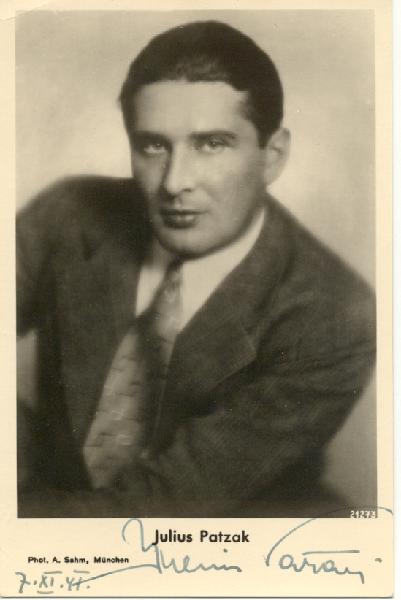Patzak studied composition and conducting in Vienna, and was originally a church musician. In 1926, he made his debut as a
self-taught tenor; after one season each in Liberec/Reichenberg and Brno/Brünn, he was one of the leading tenors of the
Bavarian State Opera Munich from 1928 to 1945, and of the Vienna State Opera from 1946 to 1959; he retired in 1966. Guest
appearances: Salzburg festival (many, many appearances from 1938 to 1953), Covent Garden (several times from 1938 to 1954),
Rome, Florence, Amsterdam, Antwerp, Stockholm, Copenhagen, Strasbourg, Budapest, Prague.
His repertory was incredibly wide and varied, from Bach to Britten, from Adam in Zeller's Vogelhändler to German, from
David to Bacchus, from Nureddin to Luigi, opera, operetta, lied, oratorio. He was considered a specialist for Mozart, Schubert
and Wolf, his most successful operatic roles were Florestan, Matthias (Der Evangelimann by Kienzl) and Palestrina, besides his
Mozart of course: Belmonte, Tito, Tamino.
I used to be convinced that his transparent, thin, airy voice was small (and his records still leave me with that impression),
but that's wrong, totally wrong. I realized when I had the chance to view a rare, early, unpublished Austrian TV production of
Salome, with Patzak as Herodes and Hans Hotter as Jochanaan, basically a live performance in a TV studio. Now I can tell from
personal experience that Hotter had a voice of almost frightening volume – certainly the largest voice that I've ever
heard in a theater. And in that TV Salome, it became clear that Patzak's voice was hardly smaller than Hotter's!! So what he was
lacking in heft, steel and edge, he made up for by volume, which explains how he could sing German, Grigorij, Kaiser or Bacchus.
To judge Patzak's singing is difficult for me: his diction distracts me to the extent of having to back out. I think for anyone
familiar with the Viennese dialect, it's impossible to take Patzak seriously, i. e. to find him credible in any serious music.
It's admittedly fascinating, to some extent, to hear such a pure, original Viennese dialect, long since superimposed by the
urban slang of a large modern city. Karl Terkal spoke the same lower-class
Viennese dialect in real life – but had a beautiful, impeccable German diction when singing. Patzak, in sharp
contrast, never learned proper German; he uses those flat, chewed, stretched-out vowels and almost irrecognizably soft
consonants that one would expect from a Vienna marketer or innkeeper also when singing Verdi or Massenet. He even uses them when
singing Italian!! That pronunciation may be endearing in the right kind of music, but it inevitably makes your funnybone tickle
if you listen to some tragic or dramatic aria, and have to think of Ottakring all the time (Ottakring is the paradigmatic
proletarian district of Vienna where such a diction is, or was, at home).
Of course, Patzak was really great when singing popular Viennese songs, or selections from those theatrical comedies with
incidental music that were such a beloved genre in 19th century Vienna. In opera, I admit that he was a great Herodes and Mime;
everything else is, I guess, only for those who don't understand German.
Reference 1; reference 2: Kutsch & Riemens
